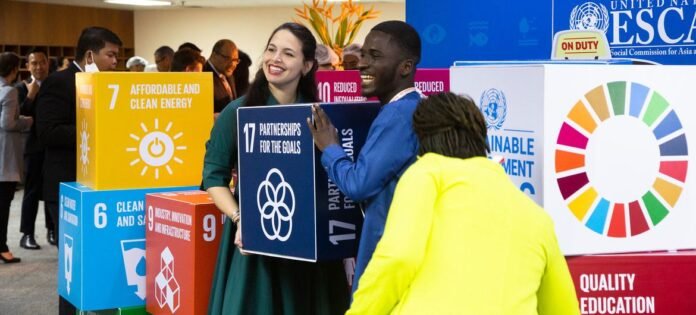The ‘International Day for South-South Cooperation’ is observed on 12 September every year.
To mark the occasion, Dima Al-Khatib, Director of the United Nations Office for South-South Cooperation, in an exclusive conversation with UN News, discussed the power of solidarity and cooperation among developing countries to achieve transformative change.
UN News: Why is South-South cooperation so important?
Dima Al-Khatib: Nowadays, countries in the Southern Hemisphere are grappling with a variety of complex development challenges. In recent years, these difficulties have become more serious due to the global pandemic and the resulting situation.
At the same time, the world is currently facing many crises that these countries are also facing. Be it geopolitical, food security, education or economic crisis. This is a very complex context for development.
This is a backdrop where there is a need for constructive cooperation between countries on development issues.
For example, when we talk about climate, we are not talking about a single country. Climate, water management, natural disasters are not bound by geographical boundaries.
The impact of peace and development also transcends borders.
Therefore, if countries do not cooperate with each other to address these various complexities and bring about changes commensurate with the challenges, it is a missed opportunity.
UN News: What are some examples of countries in the Global South working together to support each other?
Dima Al-Khatib:: I am from Lebanon and I would like to give an example of a regional initiative, led by the United Nations Development Programme, which aims to fight corruption.
Through this initiative, countries are given technical assistance in formulating anti-corruption strategies.
This has made it possible to create a network of policymakers from all countries in the region, who meet regularly and learn from each other on specific issues from a policy perspective and legal dimension. This network has proven to be extremely successful.
Participants of the Global South-South Development Exhibition, to be held in 2022.
UN News: How common is it to find examples of mutual cooperation between countries?
Dima Al-Khatib:: An important project funded by the India-UN Partnership Fund focuses on energy resource transfer.
The project involves 10 countries, supported by the Solar Alliance. Through this, countries are not only learning from each other, but also ensuring that whatever is achieved through the program is aligned with the national development priorities and plans of the respective countries.
Therefore, it has a national dimension and also a regional one.
UN News: Does this cooperation also work between countries located on different continents?
Dima Al-Khatib: I love this example, because I saw it firsthand when I traveled to China. We are partnering with China on an initiative focused on digital management of urban transport.
An excellent example of creative collaboration between Hong Shu in China and San Tiago in Chile is learning how to manage transportation in large cities.
It helps to overcome traffic jams, provide convenience to common citizens and reduce pollution with the help of digital technology.
There are many other examples that illustrate its cumulative effect.

A doctor checks the health of a child in Cambodia.
UN News: What role do youth play in South-South cooperation?
Dima Al-Khatib: If you look at the composition of the population in the countries of the Global South, the majority of the population is young.
They are agents of change, and very important to us. We are working with the United Nations Educational, Scientific and Cultural Organization to connect universities in countries in the Global South.
This is very important, because it not only strengthens the space of green education, but also creates a network of mutual involvement between young people in universities.
This is an initiative that can be implemented in many other universities as well.
UN News: What is the connection between South-South cooperation and the upcoming ‘Summit for the Future’?
Dima Al-Khatib: With only five years left to achieve the Sustainable Development Goals, the upcoming summit is a crucial moment. And we are far behind, with only 17 percent of the target being met at the right pace.
Therefore, this is an opportunity to renew our commitment to this agenda of South-South cooperation. At the same time, it is committed to addressing other pressing development challenges, including rising debt, climate change and health issues, through similar solutions.
I believe that many countries in the Global South have presented many solutions and are waiting for the support of other countries to move towards solutions.

